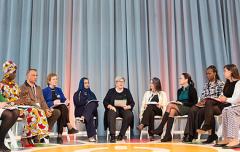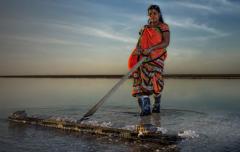Training and entrepreneurship are key in empowering women and reducing inequalities in developing countries
This blog post is part of a series Sustainable Energy for All (SEforALL) is running throughout March related to our work and partners from the People-Centered Accelerator. The series has been timed to coincide with International Women’s Day on March 8, 2018.
Women are critical actors for development. They are often the sole breadwinners and responsible for daily chores in their households, ensuring that their families are fed and clothed. They are also the main energy providers in developing countries since they manage purchases and supplies of energy. Given that women without a sustainable power source spend three hours a day on average collecting non-renewable fuel for cooking and are the first to die from pollution-related illnesses, they are the biggest sufferers from the energy gap. These characteristic features make women’s empowerment both a challenge and an opportunity for anyone who wants to ensure a transition to a sustainable social model that bridges the gender gap and ensures achievement of their huge potential, contributing to a reduction of inequalities around the world.
Achieving all of these goals was also a key motivating factor for Schneider Electric’s active participation and formal partnership with the People-Centered Accelerator, which was launched by Sustainable Energy for All last fall.
Our vision of Training and Vocational Education enhances women’s integration by focusing on several key topics:
- improving hard and soft skills
- facilitating their access to the labor market
- fighting cultural and gender schemes
As women better navigate every aspect of the economy and access a wider range of job opportunities, they can find stable sources of income and improve their social standing. Women should be considered as a relevant and qualified workforce that have the potential to fully transform developing economies.
Women’s training in sustainable energies always has a positive impact on health, income generation and family well-being. As such, each development strategy should devote a significant part of its vision and means towards improving their skills, knowledge and integration. Companies and economies that have achieved mutual professional recognition between men and women are growing faster and better than others.
Women are already a significant actor of the economy, through business ownership and creation. One third of Africa’s companies are female owned, and it rises to 61 percent in the Ivory Coast. However, there is still room for improvement in several areas, especially in entrepreneurship. One of the pillars of our development vision is to support female entrepreneurship through training, mentoring and investing. To us, this is a powerful means of development. Women who create their businesses often become local business leaders, bringing about further self-made economic growth and innovation in their areas.
As local ecosystems tend to be rather unsupportive by lack of means, we want to generate suitable environments where disruptive businesses that meet local needs can emerge. Addressing issues raised and faced by women is a key priority of businesses we want to support, further enabling female actors of change to thrive.
Developing skills and innovation in energy areas for women reduces inequalities. Benefitting from sustainable and clean power access frees time to undertake new initiatives and prevent diseases from happening. On average, women spend six hours a day collecting water and another three hours collecting wood to fuel inefficient and polluting cookstoves. Respiratory diseases directly caused by dirty cookstoves kill an estimated four million people each year. Skills training is an efficient answer to reduce health and economic inequalities in developing country. Freeing up time for professional activity and setting up businesses also means creating local economic structures that are needed for developing economies to better address local development challenges. Women should be among the key perspectives for anyone who wants to reduce development inequalities.
The Access to Energy by Schneider Electric program has supported more than 950 entrepreneurs throughout its existence and trained more than 140,000 people. Consistent with our vision of addressing development and inequalities at all levels, we have been setting up programs designed to bridge development gaps through training and entrepreneurship. Our numerous success stories in supporting the emergence of female leaders feed our conviction and commitment to gender equality and reduction of inequalities, Access to Energy brings more and more women into our program, investing in tomorrow’s leaders.
To find out more about joining the People-Centered Accelerator, or any other partnership opportunity with SEforALL, please email partnerships@SEforALL.org
Read more on the Accelerator here and follow #SDG7AllEqual for the latest.



